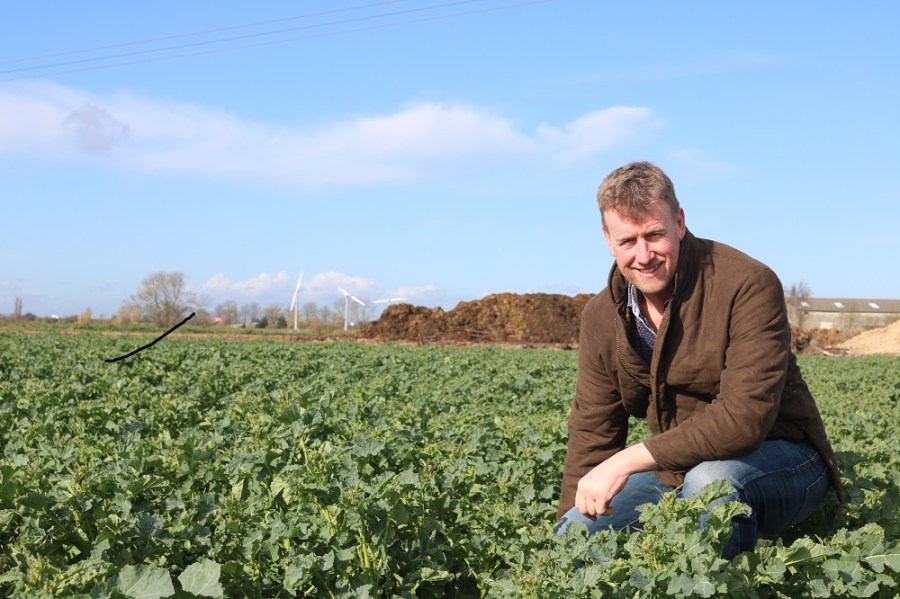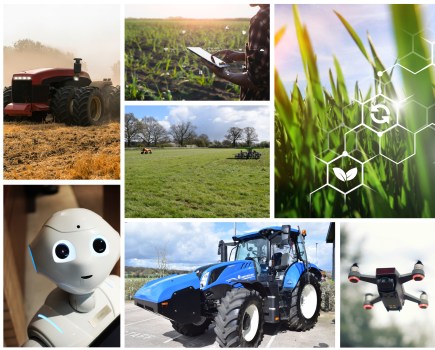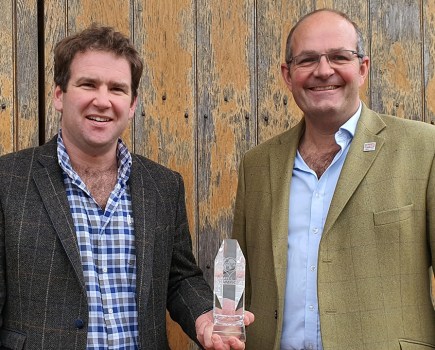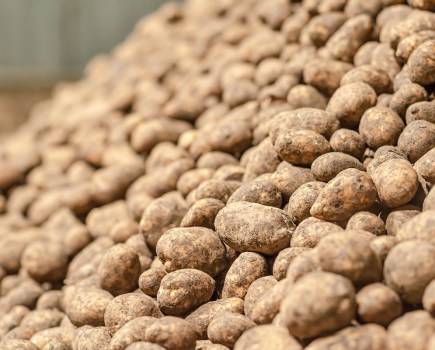Reducing soil disturbance and increasing its organic matter underline a quest to improve the resilience and potential of the crops for a Fenland farm. CPM visits to review progress.
I’ll always take opportunities as they come to make environmental gains, but our first priority is to make money.
By Tom Allen-Stevens
What you notice about Nigel Harrison’s oilseed rape are the strong, thick stems. It’s the beginning of March, and like most crops in the area, this has sat in saturated soils for much of the winter. So as a spade goes into the Fenland, silty clay loam you wouldn’t expect much in the way of life and vibrancy from what it unearths, especially following a weekend of heavy rainfall.
But what the spade reveals is a healthy structure with good evidence of exploratory roots, and there’s no trouble finding the odd worm. While the health of his soil is important for Nigel, though, he’s clear on its purpose. “I’ll always take opportunities as they come to make environmental gains, but our first priority is to make money,” he says.
This has been the driver behind the changes he’s made to the farming business, MW Harrison, which farms 400ha in a 10-mile radius, based at a 145ha county council holding near Wisbech, Cambs. The farm’s run hand-in-hand with Nigel’s contracting business, HAC, that offers drilling, spraying and harvesting services across a 25-mile radius.
“My view is that generally farmers want to do too much in the way of cultivations. What we’ve aimed to do with our land is to farm it in a different way, looking to maintain or increase levels of organic matter and apply less soil disturbance. We’re also keen to show our contracting customers how a different approach to cultivations and a different farming system can be beneficial,” he notes.
The implications for climate change could be considerable. Soils in the area are estimated to be losing carbon at a rate of between 1-12.5t/ha per year, according to a Committee on Climate Change report prepared by Cranfield University. Intensive agriculture gets the blame, with a recent Environment Agency report noting that this has caused UK arable soils to lose 40-60% of their organic carbon. It’s the degraded peatland soils that are frequently singled out for concern, and these make up about a quarter of the East Anglian Fens, accounting for around 10% of the nation’s potato, sugar beet and vegetable production.
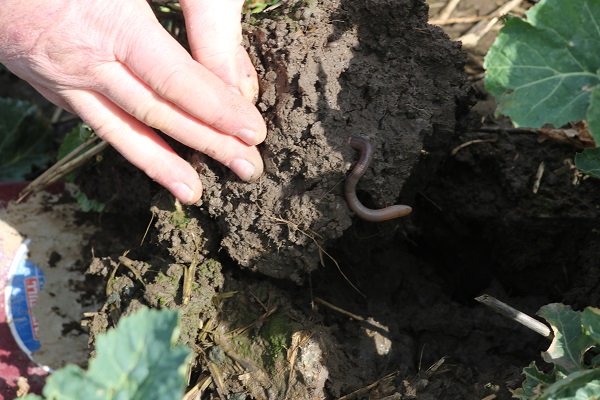
A policy of building organic matter with less soil disturbance has built a healthy structure with good evidence of exploratory roots.
For the past ten years, Nigel’s been actively working to improve the long-term health of his soils, but carbon preservation is a secondary consideration. “Initially the driver was blackgrass control, and we also wanted to learn how to structure the soil better to improve productivity. We’ve been looking at ways of introducing organic material and kit that involves lower disturbance.”
Previously this centred around a Weaving drill, and Nigel’s seen how other growers have succeeded by going down the direct-drilling route. But with maize and sugar beet in his rotation, that also includes OSR, peas and beans along with winter wheat and spring oats, no-till is not an option he favours.
“We’ve considerably reduced how much we plough, but still use one, and I’m not sure direct drilling works well on our high organic matter Fenland soils. In my experience, you still need some degree of low-disturbance cultivation,” says Nigel. “You have to match the cultivations to the drill – these account for around 75% of the success of the job.”
Nigel decided to build his own with the help of Chris Lane from Tillso. This incorporates ultra low-disturbance legs that work down to 200-250mm depth and a set of wavy discs that penetrate up to 40mm of the surface. “The key is to loosen the soil but not invert it,” he says. “We’re also looking for a friable top surface.”
Looking to take the system on a step further, Nigel was drawn to Pöttinger’s Terrasem drill. “I saw one working first on a neighbour’s farm. I was impressed by the build quality, but what I like most are the wave discs. These achieve the same aim of disturbing just enough of the soil surface to produce a friable tilth.”
There are two rows of 510mm diameter wave discs on the Terrasem, spaced at either 12.5cm or 16.7cm centres, which each work a 45mm-wide strip to a depth of just 10-15mm. These are directly in line with the Dual Disc coulters, parallelogram-mounted and placed in two rows 320mm apart, while press wheels set the coulter depth and close up the seed slot behind.
The system is ideal for the carbon-conscious Fenland farmer looking to establish crops in a range of conditions in a maritime climate, says Pöttinger’s Shaun Kent. “Smooth, straight discs work fine in drier conditions but on wetter soils they cause smearing and tend to hairpin trash into seed slots,” he notes. “The wave creates just enough disturbance for a friable surface. This puts the seed into a good tilth and creates a channel with good water permeability. The wave is a flexible system that can adapt to a range of drilling conditions.”
Shaun adds that Pöttinger’s IDS (Intelligent Distribution System) that carefully conveys the correct flow of seed to the coulters and the depth control provided by the Dual Disc coulters themselves ensure the seed-to-seed and depth placement for optimum establishment. “The Terrasem delivers a uniform germination that’s as close as you can get to a precision drill, allowing a step-up in productivity.”
Nigel establishes all combinable crops with his 6m Terrasem, which can total up to 1200ha per year, including the area drilled under contract. The drill’s delivered this year’s strong-looking crop of OSR that he expects to yield the farm average of 4-4.5t/ha.
He’s also managed to reduce inorganic fertiliser inputs and build organic matter across his arable acreage, thanks to judicious use of manure, digestate and paper pulp. Central to this has been a close working relationship with BioCow, that operates a 500kW anaerobic digestion (AD) plant at nearby Murrow, claimed to be one of the UK’s biggest on-farm plants powered from cattle waste.
The plant takes in waste vegetables and maize from Fenland farms which are fed to the unit’s 3000 dairy-bred steers. The core feedstock for the AD plant itself is manure from the cattle which are finished outdoors in holding pens, bedded with straw. As well as electricity, the plant produces about 28,000m³ of digestate, some of which Nigel spreads on his land as an alternative source of nitrogen. “I supply BioCow with maize and straw and take fresh manure, as well as solid and liquid digestate from the plant. This completes the loop in a very carbon-efficient system that works well economically for both businesses,” notes Nigel.
He takes 3000-4000t/yr of organic material from BioCow and also spreads up to 50t/ha of paper waste from the Palm Paper plant at Kings Lynn. “This adds organic matter and it’s a good soil conditioner. You have to be careful it doesn’t lock up N, although I’ve never experienced problems,” says Nigel.
The maize in his cropping mix has allowed him to open out his rotation, which also includes cover crops grown in front of the high proportion of spring-sown crops. “Maize has a bad reputation, and you often see it harvested late with little consideration paid to the soil. We aim for early maturing varieties we can harvest in late Sept or early Oct. It can put out a fantastic root if you have the right soil structure. We currently plough in front of the crop, but plan to move this to non-inversion too, which will help further with blackgrass control,” he notes.
It’s not just in the field where Nigel’s reducing his carbon footprint. Two 10KW wind turbines have been erected which help to power a 1000t grain store as well as putting surplus electricity to the grid. The farm’s also in Countryside Stewardship with 5-6ha grown with wildflower mixes and wild bird cover.
“This does wonders for the wildlife and for the public image of farming. But we’re farming productive land here, and that remains my key priority. The practices we’re putting in place are improving the nature of the soil, and while that may have a carbon benefit, the main advantage is the productivity benefit it will bring for many years to come,” notes Nigel.
What makes Nigel Harrison a Climate Change Champion?
Innovative ideas
A focus on the long-term productivity of his soils has been behind Nigel’s quest to bring a different approach to his cultivations and encouraged him to take the next step and progress further. It’s an approach he also advocates to his contracting clients.
Productivity push
Cultivations have been progressively reduced while the farm has maintained its level of output. The rotation has also been opened up and there’s less reliance on bought-in fertiliser and on herbicides for blackgrass control. The result is a more resilient and sustainable farming system using lower resources.
Cultivation care
Changes to cultivations have been entirely in tune with the soils and situation Nigel is faced with, to the extent of fabricating his own cultivator. These changes have gone hand in hand with a programme of building soil organic matter. It’s a progressive, on-going journey of reducing impact on the soils and building their resilience that will help address concerns over Fenland soil decline.
Bio-based boldness
The farm has two wind turbines and works closely with a local AD plant.
A new generation points the way to success on sustainability
As every family-owned business knows, it’s when the next generation steps forward that the long-term goals come sharply into focus. For the Pöttinger family, it’s the fifth generation since Franz Pöttinger founded the company in 1871 that’s now making its presence felt, and that puts climate change as a central theme in the company’s activities.
“It’s a fundamental belief within the company that our farmer customers consider themselves guardians of the soil, and we’re here to help them deliver on that commitment,” says Pöttinger UK sales and marketing support manager Shaun Kent. “It drives everything we do and every innovation we bring to market.”
When it comes to cultivation equipment there’s really quite a simple shared objective, he notes: to move less soil while increasing productivity. But while farmers may share a common goal towards a sustainable increase in effectiveness, efficiency and quality in agricultural production, every farm is different.
“The specific requirements of a Ukrainian grower are very different to those of a farmer in North West Europe. So it’s an underlying remit for us that cultivation equipment must be flexible and adapt to the needs of growers.”
Shaun recognises that those needs themselves will change, and it’s the progressive growers like Nigel who not only identify those changes, but are bold enough to try out different approaches. “Nigel’s taken it one step further by bringing his contracting customers along on the same journey. We believe it’s one that’s bound for success, which is why Pöttinger is pleased to support Nigel’s nomination as Climate Change Champion 2020.”
Climate Change Champions
UK Farming has set itself the challenging target of Net Zero emissions by 2040. Although led by the NFU, it will take the entire industry, working together in a partnership approach to meet this ambitious goal.
But there are individual growers, thought leaders who have already started on this journey. They have the ideas, the progressive outlook and the determination to shape positive change. CPM has teamed up with leading agricultural suppliers who have a credible Net Zero aspiration to identify these individuals and bring them into the top-level discussion about how farming can position itself as the solution to climate change. CPM readers will get the chance later this year to decide who will be awarded the accolade of Climate Change Champion 2020.

